Users
User Roles in SearchBlox: Super Admin, Admin, Manager, and Business User
SearchBlox provides a role-based access control system to manage user permissions and responsibilities within the Admin Dashboard. There are five types of user roles, each with distinct levels of access and capabilities:
- Super Admin
- Admin
- Manager
- Business User
- Content Manager
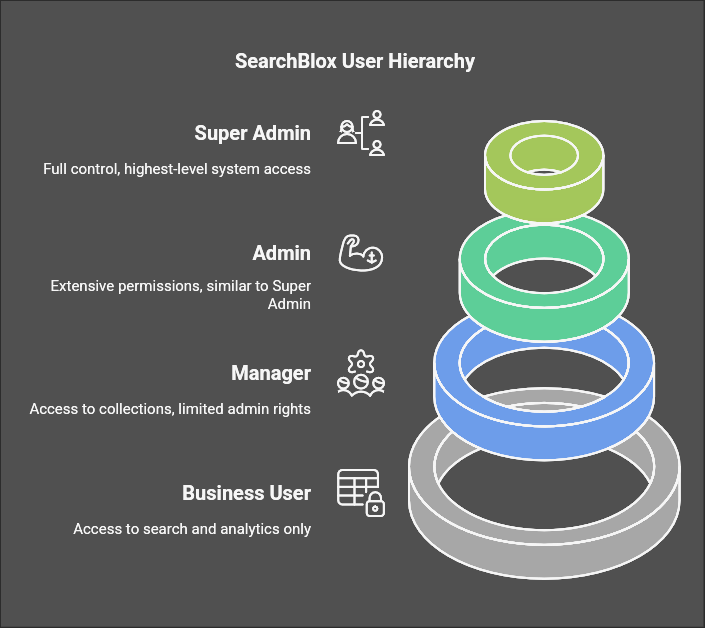
User Access Overview
| User Role | Collection Management | Search | Analytics | User Management |
|---|---|---|---|---|
| Super Admin | Full Access | Full Access | Full Access | Full Access |
| Admin | Full Access | Full Access | Full Access | Full Access |
| Manager | Limited Access | Limited Access | Full Access | No Access |
| Business User | No Access | Full Access | Full Access | No Access |
| Content Manager | Limited Access | Full Access | Full Access | No Access |
User Access
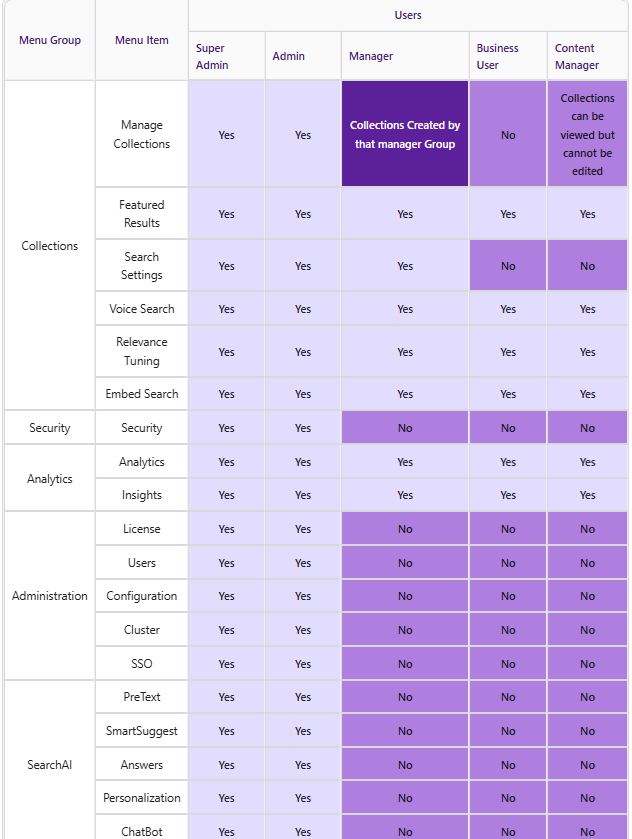

Super Admin
The Super Admin is the highest-level user in the SearchBlox Admin Dashboard, with full control over the system. This role is automatically assigned to the user who logs in for the first time after installation.
Key Features of the Super Admin Role:
- Initial Login: The Super Admin is the user who logs in for the first time after installing SearchBlox.
- Complete Rights: The Super Admin has full access to all features, settings, and configurations in the SearchBlox Admin Dashboard.
- Exclusive Role: There can be only one Super Admin in a SearchBlox instance.
- User Management: The Super Admin can create, modify, and delete other users (e.g., Admins, Managers, Business Users). Assigns roles and permissions to other users.
- Search Across All Collections:: The Super Admin can search and access all collections in the system, regardless of permissions or restrictions.
Responsibilities of the Super Admin:
- System Configuration: Set up and manage system-wide settings, integrations, and configurations.
- User Management: Create and manage user accounts, ensuring appropriate roles and permissions are assigned.
- Security and Performance: Monitor system security, performance, and uptime.
- Troubleshooting: Resolve technical issues and provide support to other users.
- Content Oversight: Ensure the accuracy and relevance of search results across all collections.
Admin
The Admin role in SearchBlox is a powerful user role with extensive permissions, allowing users to perform most activities similar to the Super Admin. However, there are some distinctions between the two roles.
Key Features of the Admin Role:
- Permissions: Admins can perform all activities that the Super Admin can, except for certain system-wide settings (e.g., creating another Super Admin).
- Multiple Admins: Unlike the Super Admin, there can be more than one Admin in a SearchBlox instance.
- Search Across Collections: Admins can search and access all collections, including those created by other users (e.g., Managers, Business Users).
- Unique SB-PKEY: Each Admin is assigned a unique SB-PKEY (SearchBlox Private Key).
The SB-PKEY is used for Accessing REST API requests, Enabling secure communication with the SearchBlox server.
Responsibilities of the Admin Role
- Collection Management: Create, modify, and delete collections.
- User Management: Create and manage users with lower privileges (e.g., Managers, Business Users).
- Search Configuration: Configure search settings, such as relevancy tuning, facet filters, and auto-suggest.
- Monitoring and Reporting: Monitor search performance and generate reports.
API Integration: Use the SB-PKEY to integrate SearchBlox with external systems via REST API.
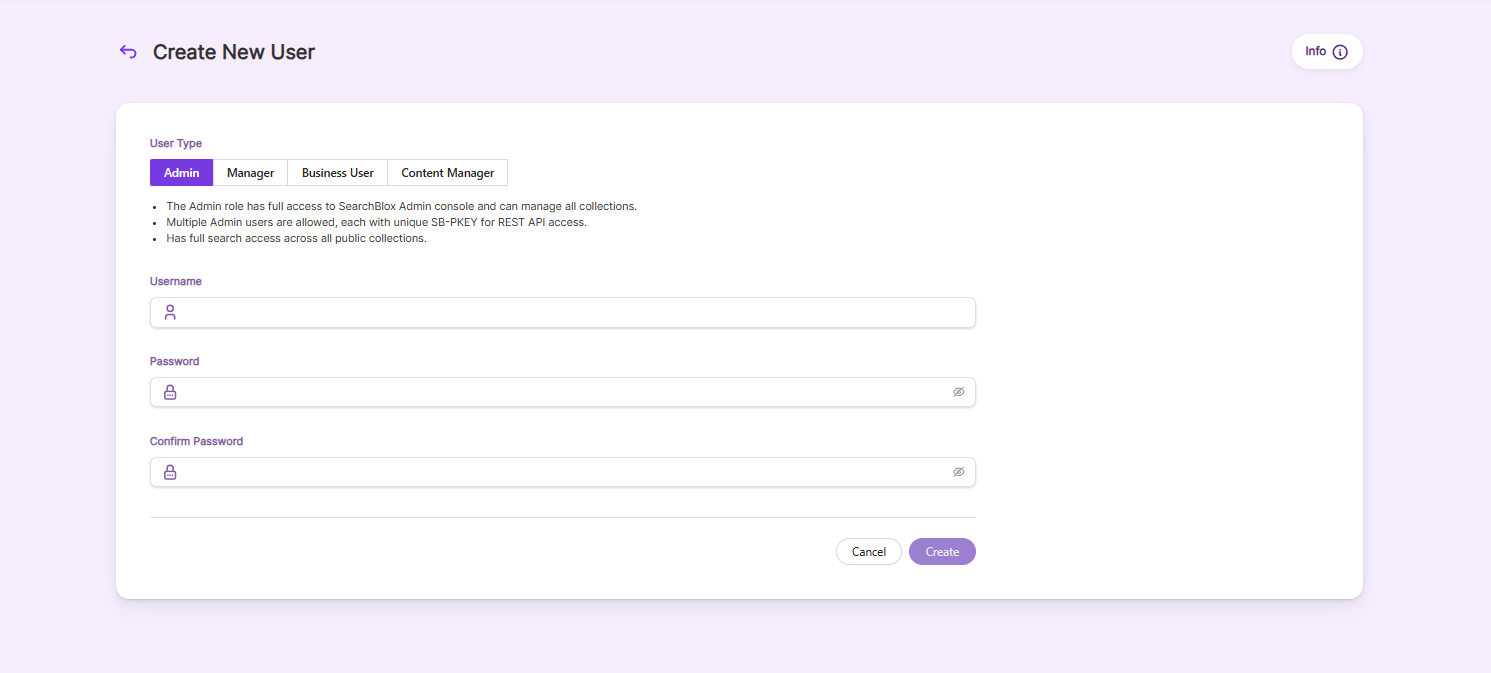
Below Image references to the Admin user's Private Key a.k.a. SB-PKEY:

Manager
The Manager role in SearchBlox is designed for users who need access to specific collections and limited administrative capabilities. Managers have restricted permissions compared to Admins and Super Admins, making this role ideal for team leads or department heads.
Key Features of the Manager Role:
- Collection Access: Managers can access only the collections created by their user group.
They can belong to more than one user group, allowing access to multiple sets of collections. - Dashboard Access: Managers can access other menu items on the Administration Dashboard, depending on their permissions. Access can be restricted to "search only" if needed.
- User Management Restrictions: Managers do not have access to the User tab and cannot create or manage other users.
- Sensitive Content Access (Version 10.0+): From version 10.0, it is possible to encrypt content and meta fields. Only Manager users with the "sensitive option" enabled in User Management can view this encrypted content. Learn more about Collection Encryption
- Group-Specific Collections: Managers have access to collections specific to their assigned user groups.
Responsibilities of the Manager Role:
- Collection Management: Manage and maintain collections within their assigned user groups.
- Content Oversight: Ensure the accuracy and relevance of search results for their collections.
- Sensitive Data Handling: Access and manage encrypted content if the "sensitive option" is enabled.
- Reporting: Monitor search performance and provide feedback to Admins or Super Admins.
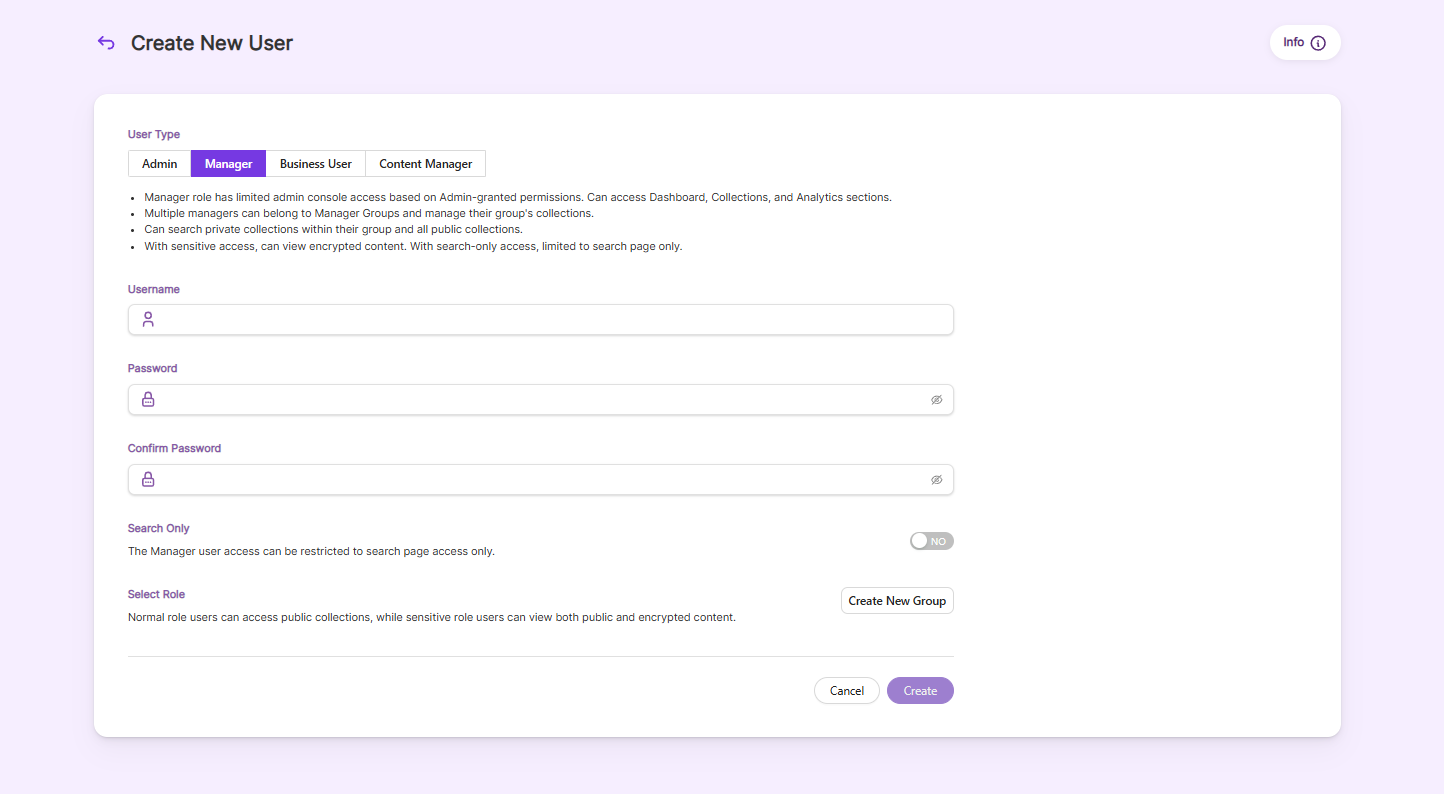
Business User
The Business User role in SearchBlox is designed for users who need access to search functionality and analytics but do not require administrative privileges or access to collection management. This role is ideal for end-users, analysts, or stakeholders who need to monitor search performance and retrieve information.
Key Features of the Business User Role:
- Access to Search and Analytics: Business Users can access the Search Tab to perform searches and the Analytics Tab to view search performance metrics.
- No Access to Collections:
Business Users do not have access to collections and cannot create, modify, or delete collections. - Multiple Business Users:
There can be multiple Business Users in a SearchBlox instance. - Restricted User Management Access:
Business Users do not have access to the User Management tab and cannot create or manage other users. - Search Across All Collections:
Business Users can search across all collections, regardless of who created them.
Responsibilities of the Business User Role:
- Search and Retrieval: Perform searches to retrieve relevant information from all collections.
- Analytics Monitoring: Use the Analytics Tab to monitor search performance, user behavior, and trends.
- Reporting: Provide feedback or reports based on search analytics to Admins or Managers.
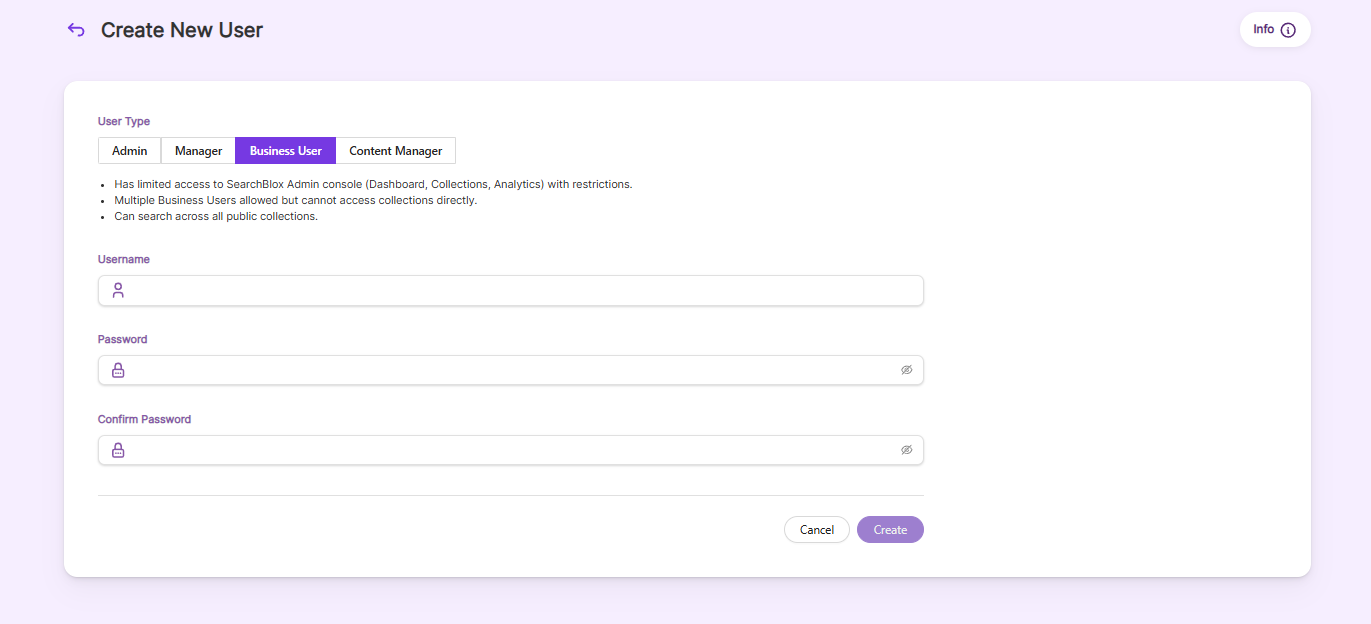
Content Manager
The Content Manager role in SearchBlox is designed for users who need access to search functionality, featured results and analytics, limited access to collection management but do not require administrative privileges. This role is ideal for end-users, analysts, or stakeholders who need to monitor search performance and retrieve information.
Key Features of the Content Manager Role:
- Access to Search and Analytics: Content Managers can access the Search Tab to perform searches and the Analytics Tab to view search performance metrics.
- Access to Featured Results:Content Managers has full access to featured results, including create, delete, download and upload functionalities.
- Limited Access to Collections:
Content Managers have limited access to collections and cannot create, modify, or delete collections, just can view the collections. - Multiple Content Managers:
There can be multiple Content Managers in a SearchBlox instance. - Restricted User Management Access:
Content Managers do not have access to the User Management tab and cannot create or manage other users. - Search Across All Collections:
Business Users can search across all collections, regardless of who created them.
Responsibilities of the Content Manager Role:
- Search and Retrieval: Perform searches to retrieve relevant information from all collections.
- Manage Featured Results:Can create, delete, download and upload the featured results.
- Analytics Monitoring: Use the Analytics Tab to monitor search performance, user behavior, and trends.
- Reporting: Provide feedback or reports based on search analytics to Admins or Managers.
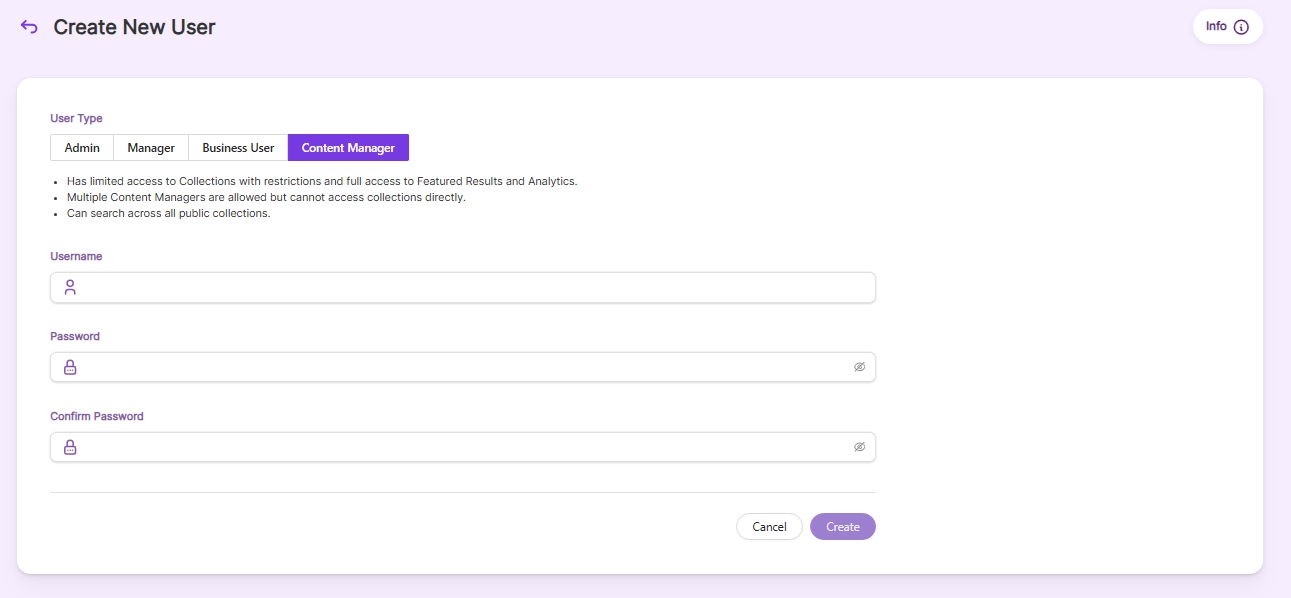
Changing Passwords
The user who can log in to the SearchBlox Admin console can change their own password on the Users page once after successful login. The password is encrypted and stored securely.

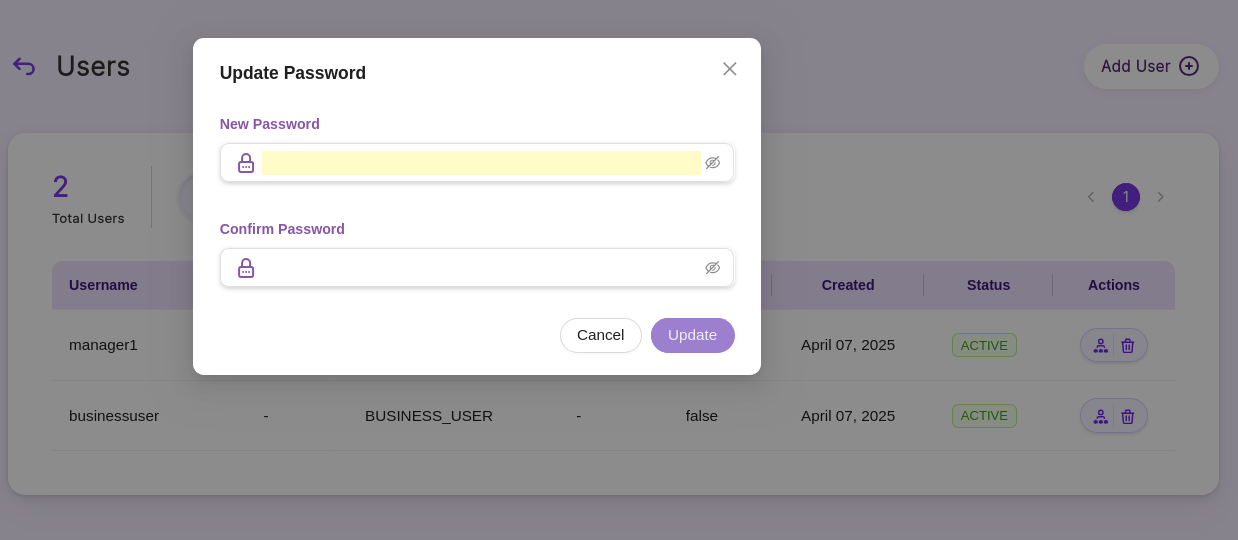
User Roles and Groups
- Users/User Groups can be created by SuperAdmin or SBAdmin while creating Manager Users.
- The naming convention requires at least 3 characters and only alphabets are allowed.
- SBAdmin and Admin users alone will be given a unique secure SB-PKEY which can be used to access REST API requests.
- A User Group has to be created while creating a Manager. Later, the same group(s) can be assigned to other Managers.
- After creating a Manager, it is not possible to change the assigned group.

User Management Permissions
| Users | Super Admin | Admin | Manager | Manager- Search Only | Business User |
|---|---|---|---|---|---|
| Creating Users | Yes | Yes | No | No | No |
| Changing Self Password | Yes | Yes | Yes | No | Yes |
| Change other User's Passwords | Yes | Yes | No | No | No |
| Remove another User | Yes | Yes | No | No | No |
Sensitive User Roles
| Users | Access |
|---|---|
| SearchBlox Realm - Manager Role Search Only Access | - Does not have access to SearchBlox Admin Console. - Will have access ONLY to the same Manager groups' search results, which includes the Public and Private Manager group collections, along with all other Users' Public collections. - The encrypted collections' content can be accessed ONLY by the Sensitive role Users. |
| LDAP/OKTA - External Users | - Does not have access to SearchBlox Admin Console. - Can access Secure Search results page. - LDAP or OKTA with AD Users will have restricted access to Private collections, based on User/Role configuration, along with access to all Public collections. - OKTA Users will have restricted secure search access to both Public and Private collections, based on access in the configuration done on the OKTA end. |
Updated 9 months ago
